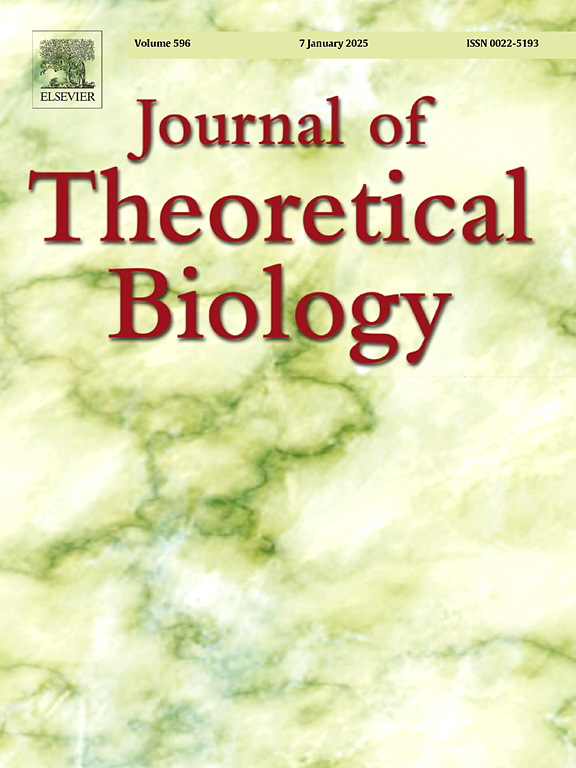蛋白质稳定性对热异构环境的适应。
IF 2
4区 数学
Q2 BIOLOGY
引用次数: 0
摘要
适当的蛋白质折叠对生物功能至关重要,它的破坏可能导致疾病、健康降低或死亡。因此,蛋白质保持其折叠构象的能力对生命至关重要,使其成为适应性进化的关键目标。然而,蛋白质的稳定性对环境因素非常敏感,尤其是温度,这可能会威胁到温度变化下的表型完整性和生物体的生存。尽管它很重要,复杂的热环境——这里以平均温度、热波动和环境异质性为特征——对蛋白质稳定性演化的影响仍然知之甚少。为了解决这个问题,我们开发了一个数学框架,结合了两个成熟的模型:一个是描述物种分布在不同热环境下的种群遗传模型,另一个是包含温度依赖焓和熵贡献的蛋白质稳定性热力学模型。我们专注于在折叠和未折叠状态之间交替的两态蛋白质,并假设等位基因适应度在实现柔韧性和刚性之间的最佳平衡的蛋白质中最大化。利用这个框架,我们进行了突变的入侵分析(感知自适应动力学框架),影响三个完全决定蛋白质稳定性的热力学参数。在可能的情况下,我们推导了进化最优热力学参数的解析表达式,并辅以数值解。我们的研究结果表明,平均温度和热波动对热力学参数有正交影响,强调在研究蛋白质稳定性适应时需要考虑两者。我们进一步研究了热异质性环境,其中通过迁移连接的亚种群经历不同的平均温度,确定了有利于局部(专业)或全球(通才)适应的条件。我们的研究结果可能解释了为什么一个热力学参数与热适应的关系不大,并表明局部适应更可能是那些稳定性谱限制在狭窄温度范围内的蛋白质。此外,我们的分析还揭示了一种适应当地环境的蛋白质是来自较冷还是较暖的栖息地。最后,我们确定了影响局部或全局适应的热力学参数的权衡。该研究提供了复杂热环境下蛋白质进化的关键预测,并为开发实用工具来理解温度如何影响适应和生物多样性奠定了基础。本文章由计算机程序翻译,如有差异,请以英文原文为准。
Adaptation of protein stability to thermally heterogeneous environments
Proper protein folding is essential for biological function, and its disruption can lead to disease, reduced fitness, or death. The ability of a protein to maintain its folded conformation is thus critical for life, making it a key target of adaptive evolution. However, protein stability is sensitive to environmental factors, particularly temperature, which can threaten phenotypic integrity and organismal survival under thermal changes. Despite its importance, the influence of complex thermal environments – characterized here by mean temperature, thermal fluctuations, and environmental heterogeneity – on the evolution of protein stability remains poorly understood. To address this, we developed a mathematical framework that combines two well-established models: a population genetic model describing species distributed across habitats with distinct thermal environments, and a thermodynamic model of protein stability incorporating temperature-dependent enthalpy and entropy contributions. We focus on two-state proteins that alternate between folded and unfolded states and assume that allelic fitness is maximized in proteins that achieve an optimal balance between flexibility and rigidity. Using this framework, we performed an invasion analysis of mutations (sensu adaptive dynamics framework) affecting three thermodynamic parameters that fully determine protein stability profiles. Where possible, we derived analytical expressions for evolutionarily optimal thermodynamic parameters and complemented these with numerical solutions. Our results show that mean temperature and thermal fluctuations have orthogonal effects on thermodynamic parameters, underscoring the need to consider both when studying protein stability adaptation. We further examined thermally heterogeneous environments, where subpopulations connected by migration experience different mean temperatures, identifying conditions that favor either local (specialist) or global (generalist) adaptation. Our results may explain why one thermodynamic parameter shows little association with thermal adaptation and suggest that local adaptation is more likely for proteins with stability profiles limited to narrow temperature ranges. Additionally, our analysis reveals whether a locally adapted protein originated in a colder or warmer habitat. Finally, we identified trade-offs in thermodynamic parameters that influence local or global adaptation. This study offers key predictions about protein evolution in complex thermal environments and lays the groundwork for developing practical tools to understand how temperature shapes adaptation and biodiversity.
求助全文
通过发布文献求助,成功后即可免费获取论文全文。
去求助
来源期刊
CiteScore
4.20
自引率
5.00%
发文量
218
审稿时长
51 days
期刊介绍:
The Journal of Theoretical Biology is the leading forum for theoretical perspectives that give insight into biological processes. It covers a very wide range of topics and is of interest to biologists in many areas of research, including:
• Brain and Neuroscience
• Cancer Growth and Treatment
• Cell Biology
• Developmental Biology
• Ecology
• Evolution
• Immunology,
• Infectious and non-infectious Diseases,
• Mathematical, Computational, Biophysical and Statistical Modeling
• Microbiology, Molecular Biology, and Biochemistry
• Networks and Complex Systems
• Physiology
• Pharmacodynamics
• Animal Behavior and Game Theory
Acceptable papers are those that bear significant importance on the biology per se being presented, and not on the mathematical analysis. Papers that include some data or experimental material bearing on theory will be considered, including those that contain comparative study, statistical data analysis, mathematical proof, computer simulations, experiments, field observations, or even philosophical arguments, which are all methods to support or reject theoretical ideas. However, there should be a concerted effort to make papers intelligible to biologists in the chosen field.

 求助内容:
求助内容: 应助结果提醒方式:
应助结果提醒方式:


